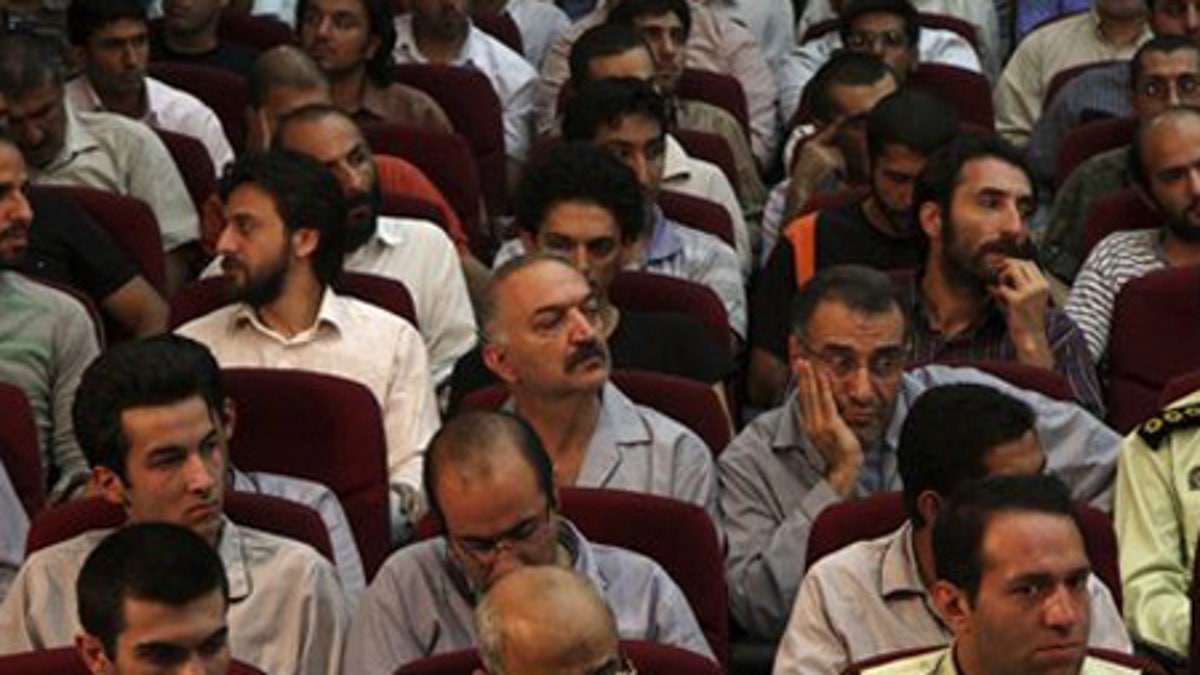
Aug. 1: Defendants sit in a court room in Tehran, Iran. (AP)
TEHRAN, Iran – Iran began its first trial of the postelection crisis on Saturday, a mass court case against more than 100 activists and protesters accused of plotting a "velvet revolution" to topple clerical rule.
Some of the most prominent politicians of the pro-reform movement, including a former vice president, were among the defendants brought before the court in gray prison uniforms. A number of them delivered confessions, according to the Iranian media.
Coming days before President Mahmoud Ahmadinejad is to be sworn in to a second term, the mass trial was part of the government's efforts to choke off a persistent protest movement by Iranians who claim his June 12 re-election was engineered through fraud.
The protesters have presented the cleric-led regime with its biggest challenge since the 1979 revolution despite a brutal crackdown that has left hundreds in prison.
A prosecutor used Saturday's hearing to press the government's claims that the opposition is a tool of foreign enemies. He accused the three biggest opposition parties of receiving money from foreign non-governmental organizations as they plotted a government overthrow.
The charges, read out in court by the prosecutor from a 15-page indictment, included attacking military and government buildings, having links with armed opposition groups and conspiring against the ruling system, Iran's official news agency, IRNA, reported.
Reformists denounced the trial and said the defendants had no access to lawyers.
The indictment described an alleged yearslong plot by the top pro-reform political parties to carry out a "velvet revolution," a popular, nonviolent uprising to overthrow the Islamic Republic similar to ones in Eastern Europe. The phrase comes from the peaceful 1989 Velvet Revolution that overthrew decades of communism in Czechoslovakia.
The prosecutor said the three main opposition parties had taken money from foreign NGOs and had sought to use the election controversy as an opportunity to carry out their plot, according to a transcript reported by IRNA. He claimed Israeli and Western officials have spoken in recent years of fomenting revolution in Iran.
"Based on the evidence obtained and well-founded confessions of the defendants, these events had been planned in advance, and stages of the velvet revolution were carried out in accordance with a time schedule," the indictment said.
IRNA did not give information about how many defendants were in court, but the semiofficial Fars news agency said more than 100 defendants were present.
They included several prominent reformist opposition activists. Among them were former Vice President Mohammad Ali Abtahi, former government spokesman Abdollah Ramezanzadeh, former Vice Speaker of parliament Behzad Nabavi, former Deputy Foreign Minister Mohsen Aminzadeh and the leader of the biggest reformist party, the Islamic Iran Participation Front, Mohsen Mirdamadi.
Pictures from the courtroom showed a thin-looking Abtahi and a grim-faced Mirdamadi, both in prison uniforms, sitting in the front row. More than a hundred defendants could be seen sitting in the packed courtroom, many of them handcuffed but without prison uniforms.
Abtahi served as vice president under former reformist President Mohammad Khatami, a strong ally of the man who says he was the rightful winner of the June election, Mir Hossein Mousavi.
A reformist lawmaker, Mohammad Reza Tabesh, said he had information from Abtahi's wife that the former vice president had lost 40 pounds, or 18 kilograms, after 43 days in custody.
IRNA reported that during Saturday's hearing Abtahi confessed to making preparations to foment unrest with other reformist leaders.
"We made extensive exercises to keep people in the streets because it would make sense within the framework of fraud in elections," IRNA quoted Abtahi as saying.
Rights groups have said such confessions are often obtained under duress in Iran.
Abtahi was also quoted as saying that powerful former President Akbar Hashemi Rafsanjani backed Mousavi to take revenge on Ahmadinejad, who defeated him in the 2005 election, and supreme leader Ayatollah Ali Khamenei.
A statement released by State Expediency Council, a body led by Rafsanjani, denied the claim and said Abtahi's remarks were false.
The reformist Web site www.mowjcamp.com denounced Saturday's trial as a sham and said defendants had no access to lawyers.
"Do those who organized this sham trial today think that the nation will remain silent to slaughter the nation's best?" read a statement on the site.
The Islamic Iran Participation Front, the reformist party, called the trial "disgusting" and a "ridiculous show."
Paris-based media watchdog Reporters Without Borders quoted Saleh Nikbakht, a lawyer for Abtahi and several other defendants, as saying he was barred from the courtroom.
"I have not had access to the prosecution case files at any point since the arrest of my clients. I was not aware of the trial until 11 a.m. today. And I did not get permission to enter the courtroom," he was quoted as saying.
Among the others on trial Saturday were two foreign citizens — Iranian-American scholar Kian Tajbakhsh and Newsweek reporter Maziar Bahari, who holds Iranian and Canadian citizenship.
Bahari was quoted by Iranian news agencies as saying in the trial that Western media had attempted to guide events in Iran following the election.
Newsweek issued a statement that Bahari's work has "always been balanced and objective" with "fairness evident throughout his decade-long career."
"We are extremely dismayed at this turn of events," the statement added.
There was no information on when the trial would end or when a verdict could be expected.
On Monday, Khamenei will lead a ceremony formally approving Ahmadinejad's second term, and two days later Ahmadinejad is to be sworn in before parliament.
Meanwhile, the anti-regime protests have continued with thousands of protesters holding a memorial at a Tehran cemetery on Thursday to commemorate those killed in the crackdown. Police fired tear gas and beat protesters with batons, but the march continued, as protesters chanted Mousavi's name.
Protesters then streamed back into central Tehran — some chanting on the subway, "Traitor Mahmoud, we want you to become homeless" — and again clashed with security forces.
